过去分词作为定语和状语的用法(新) 共19页PPT资料
过去分词(短语)作状语和定语
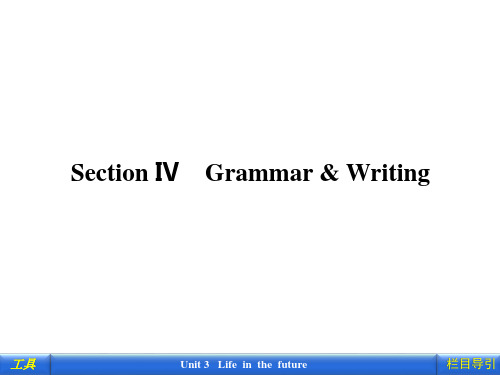
栏目导引
(2010·四川卷)A great number of students________said they
were forced to practise the piano.
A.to question
B.to be questioned
C.questioned
D.questioning
解析: 句意为:许多被调查的学生说,他们是被迫练习
答案: B
工具
Unit 3 Life in the future
栏目导引
5.________more attention,the trees could have grown
better.
A.Given
B.To give
C.Giving
D.Having given
解析: 考查过去分词短语作条件状语。句子主语the trees 与give之间是被动关系,故答案选A。过去分词短语Given more attention放于句首,作条件状语。
students.) 老师走进教室,后面跟着一群学生。
工具
Unit 3 Life in the future
栏目导引
名师指津: 1.过去分词与句子的主语之间存在逻辑上的动宾关系,即 表被动;现在分词与句子的主语之间存在逻辑上的主谓关系, 即表主动。 Asked why he was late,he cried. 被问到他为什么迟到时,他哭了。 Looking out of the window,I saw some students playing there. 我朝窗外望去,看见几个学生在那边玩耍。
分类
用法
举例
时间 状语
相当于时间状语 从句;可在过去 分词前加上连词 “when, while,until” 等,使其时间意 义更明确
专题02 非谓语动词(解析版)(1)
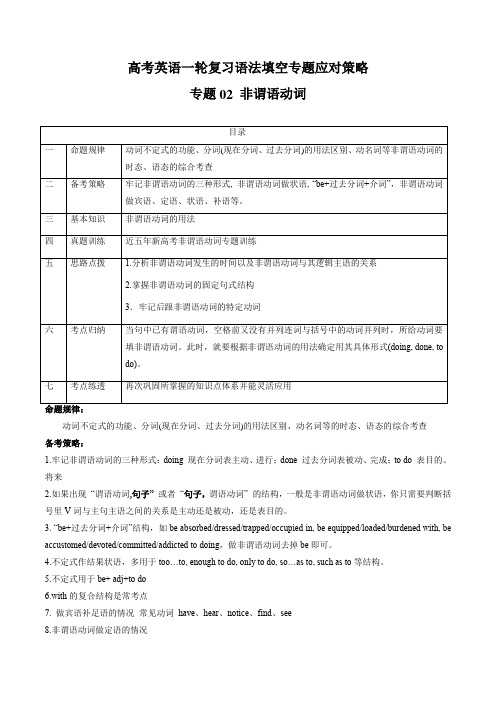
高考英语一轮复习语法填空专题应对策略专题02 非谓语动词动词不定式的功能、分词(现在分词、过去分词)的用法区别、动名词等的时态、语态的综合考查备考策略:1.牢记非谓语动词的三种形式:doing 现在分词表主动、进行;done 过去分词表被动、完成;to do 表目的、将来2.如果出现“谓语动词,句子” 或者“句子,谓语动词” 的结构,一般是非谓语动词做状语,你只需要判断括号里V词与主句主语之间的关系是主动还是被动,还是表目的。
3.“be+过去分词+介词”结构,如be absorbed/dressed/trapped/occupied in, be equipped/loaded/burdened with, be accustomed/devoted/committed/addicted to doing,做非谓语动词去掉be即可。
4.不定式作结果状语,多用于too…to, enough to do, only to do, so…as to, such as to等结构。
5.不定式用于be+ adj+to do6.with的复合结构是常考点7. 做宾语补足语的情况常见动词have、hear、notice、find、see8.非谓语动词做定语的情况基本知识:非谓语动词的用法(一)填非谓语动词时要填不定式to do的情况:1. 主语:It is/was+adj./n.+for/of sb. to do sth. It takes/took sb. some time to do sth.2.宾语(1)有些动词只能用不定式作宾语:(2) find/think/believe/consider/make/feel+it+adj./n.+to do sth.3. 表语:不定式作表语多表示某一次具体的、特定的或有待实现的动作(aim, dream, plan, purpose等后)4. 定语:(1) 不定式作定语表示将来的动作;(2) 不定式用来修饰被序数词、最高级或only, next等修饰的中心词,且与中心词为逻辑上的主动关系;(3) 下列名词或代词,常用不定式作定语。
过去分词作定语和表语

如果遇到复杂的句子结构,可以先简化句子,找出主干部分,再逐步添加 其他成分。
THANKS
表示状态、性质或特征描述
状态描述
过去分词可以表示主语所处的 状态,如“The window is
broken.”(窗户破了。)中 的“broken”表示窗户的状态。
性质描述
过去分词可以描述主语的性质, 如“She is interested in
music.”(她对音乐感兴趣。) 中的“interested”表示她的 性质。
01
观察句子结构,确定过去分词 短语在句中的作用,是作为定 语还是表语。
02
如果是定语,需要判断其与所 修饰名词之间的关系,主动关 系用现在分词,被动关系用过 去分词。
03
如果是表语,需要注意与主语 的逻辑关系,以及时态和语态 的一致性。
技巧二:注意时态、语态和主谓一致问题
在使用过去分词作定语或表语时,需要注意句子的时态和语态,确保过去 分词的形式与句子的时态和语态相符。
在使用过去分词时,需要结合具体的语境进行判断。通过分析上下文语境和逻辑关系,可以更准 确地理解句子的意思并选择合适的表达方式。
06
实战演练与技巧分享
练习题:识别并改正错误使用过去分词现象
错题1
The book, written by a famous writer, are very popular.
05
常见误区及注意事项
混淆现在分词与过去分词形式
要点一
误将现在分词用作定语
现在分词具有主动意义,表示动作正在进行或与谓语动作 同时发生,而过去分词则表示被动或完成意义。因此,在 需要表示被动或完成意义时,应使用过去分词而非现在分 词。
高二英语必修五_名师语法课堂:过去分词作定语和表语用法详解
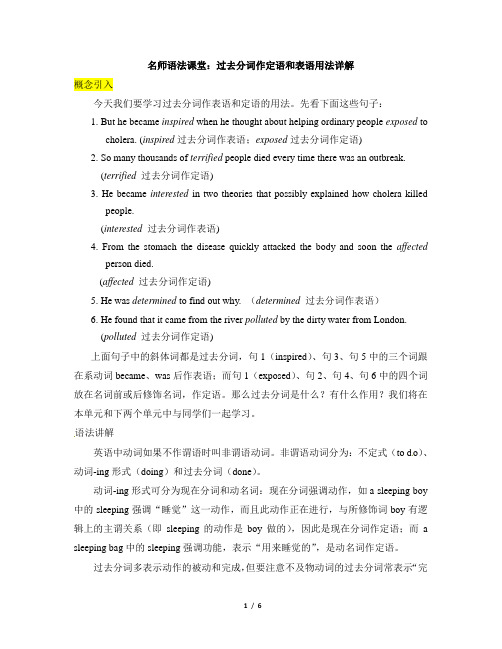
名师语法课堂:过去分词作定语和表语用法详解概念引入今天我们要学习过去分词作表语和定语的用法。
先看下面这些句子:1. But he became inspired when he thought about helping ordinary people exposed tocholera. (inspired过去分词作表语;exposed过去分词作定语)2. So many thousands of terrified people died every time there was an outbreak.(terrified过去分词作定语)3. He became interested in two theories that possibly explained how cholera killedpeople.(interested 过去分词作表语)4. From the stomach the disease quickly attacked the body and soon the affectedperson died.(affected过去分词作定语)5. He was determined to find out why. (determined过去分词作表语)6. He found that it came from the river polluted by the dirty water from London.(polluted过去分词作定语)上面句子中的斜体词都是过去分词,句1(inspired)、句3、句5中的三个词跟在系动词became、was后作表语;而句1(exposed)、句2、句4、句6中的四个词放在名词前或后修饰名词,作定语。
那么过去分词是什么?有什么作用?我们将在本单元和下两个单元中与同学们一起学习。
语法讲解英语中动词如果不作谓语时叫非谓语动词。
非谓语动词分为:不定式(to d o)、动词-ing形式(doing)和过去分词(done)。
英语过去分词的结构及其用法

英语过去分词的结构及其用法摘要过去分词是英语中一种重要的非谓语动词形式,它可以表示动作的完成和被动。
过去分词的形式有规则和不规则之分,规则动词的过去分词一般是在动词原形后加-ed,不规则动词的过去分词则需要记忆。
过去分词在句子中可以充当定语、状语、表语、宾语补足语等成分,还可以与其他词构成复合形容词、名词、副词等。
本文将从以下几个方面介绍英语过去分词的结构:过去分词的形式过去分词的功能过去分词的相关后缀过去分词的注意事项一、过去分词的形式1. 规则动词的过去分词规则动词的过去分词一般是在动词原形后加-ed,例如:动词原形过去分词work workedvisit visitedplay playedstudy studiedenjoy enjoyed但是,有些规则动词在加-ed之前需要做一些拼写变化,主要有以下几种情况:如果动词以不发音的e结尾,只需加-d,例如:动词原形过去分词live livedagree agreedhope hopeduse usedlove loved如果动词以一个元音字母和一个辅音字母结尾,并且重读在最后一个音节上,需要双写最后一个辅音字母再加-ed,例如:动词原形过去分词stop stoppedplan plannedprefer preferredadmit admittedregret regretted如果动词以y结尾,并且y前面是一个辅音字母,需要把y改为i再加-ed,例如:动词原形过去分词study studiedcry criedtry triedcarry carriedworry worried2. 不规则动词的过去分词不规则动词的过去分词没有固定的规则,需要通过记忆来掌握。
不规则动词的过去分词可以根据其与原形和过去式之间的关系,大致分为以下几类:原形、过去式和过去分词完全相同,例如:动词原形过去式过去分词cut cut cuthit hit hitput put putread read readhurt hurt hurt原形和过去式相同,而过去分词不同,例如:动词原形过去式过去分词come come comebecome become becomerun run runwin win wonswim swim swum原形和过去分词相同,而过去式不同,例如:动词原形过去式过去分词build built builtburn burnt burntdream dreamt dreamtlearn learnt learntspoil spoilt spoilt原形、过去式和过去分词都不相同,例如:动词原形过去式过去分词be was/were beendo did donego went gonesee saw seenwrite wrote written原形和过去分词以n结尾,而过去式以w结尾,例如:动词原形过去式过去分词know knew knowngrow grew grownblow blew blownfly flew flowndraw drew drawn原形和过去分词以d结尾,而过去式以t结尾,例如:动词原形过去式过去分词build built builtlend lent lentsend sent sentspend spent spent原形和过去分词以e结尾,而过去式以a或o结尾,例如:动词原形过去式过去分词give gave giventake took takenmake made madebreak broke brokenspeak spoke spoken原形和过去分词以t结尾,而过去式以a结尾,例如:动词原形过去式过去分词teach taught taughtcatch caught caughtbuy bought boughtbring brought broughtthink thought thought原形和过去分词以n结尾,而过去式以a结尾,例如:动词原形过去式过去分词begin began begundrink drank drunksing sang sungring rang rungswim swam swum二、过去分词的功能过去分词在句子中可以充当多种成分,主要有以下几种功能:1. 构成被动语态过去分词可以与助动词be或get构成被动语态,表示主语是动作的承受者,而不是执行者。
高中英语语法:非谓语动词(共48张PPT)

高中英语语法:非谓语动词(共48张P PT)
一、动词不定式
3.不定式的语态 不定式的主动式表示逻辑主语是其所表示的动作的执行者;不定 式的被动式表示逻辑主语是其所表示的动作的承受者。 I plan to study history of art at university so it is important for me to visit France.我打算在大学学习艺术史,因此访问法国对我来说是 重要的。(逻辑主语me是visit的动作执行者。) It is believed by many people to have been gradually covered over by sandstorms from AD 200 to AD 500.许多人认为它(古楼兰城) 在公元200年至500年期间逐渐被沙尘暴所覆盖。(it是cover动作 的承受者。)
高中英语语法:非谓语动词(共48张P PT)
高中英语语法:非谓语动词(共48张P PT)
一、动词不定式
(5)不定式作定语 动词不定式作定语时,须放在其修饰的名词或代词之后,通常与其所修饰的成 分之间存在着一定的逻辑关系。 I am always the first person to get to the office.我总是第一个到办公室。(不定式 与person之间是主谓关系) (6)不定式作状语 不定式作状语可以修饰动词,一般在句中作目的、结果和原因状语。不定式作 目的状语可以单独放在句首、句中或句末;作结果状语常用在下列句式中: so…as;such…as to;enough…to;only…to;too…to等。 To make friends easily, you need to be very kind.要想很容易地交朋友,你需要友 善。(不定式作目的状语) Arrived here to find everything was in chaos.到达这里后发现一切都是乱糟糟的。 (不定式作结果状语,表示意外或事与愿违的结果) I am so excited to be here!来到这我真激动!(不定式作原因状语)
高中英语语法非谓语动词详细讲解课件
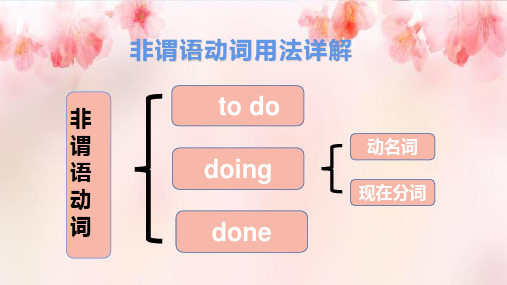
Getting up early is good habit.
To get up early this morning made me sleepy.
②动名词短语作主语时,常将一些较长的动名词短语置于句尾, 而用it 作形式主语,常用句型有:
no use/good uesful/useless It is/was+ of little use/good +doing sth. a waste of time worth It's no use crying over spilt milk. 覆水难收。 It's waste of time arguing with such a person. It's worth making an appointment before you go.
4. 动名词作定语
动名词作定语的情况并不普遍,一般只限于单个的动名词作名词
的定语,表示所修饰名词的用途或功能,在意义上相当于“名词
+for+ doing”。
swimming pool 游泳池
reading material 阅读材料
walking stick 手杖
opening speech 开幕词
2. 动名词作宾语
过去分词用法总结(共53张PPT)
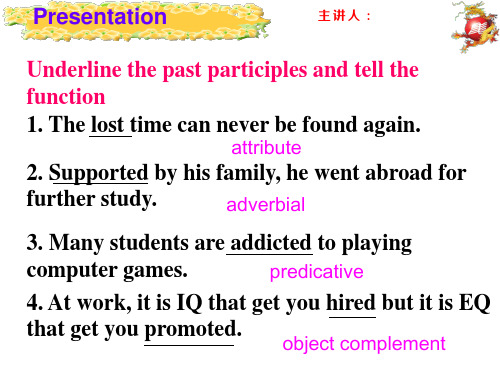
further study.
adverbial
3. Many students are addicted to playing
computer games.
predicative
4. At work, it is IQ that get you hired but it is EQ that get you promoted.
What is the language that is spoken in Italy?
What is the language spoken in Italy?
Do you know all the artists invited to the party?
Do you know all the artists who were invited to the party?
1.语态上
现在分词: 表示主动的动作 过去分词: 表示已经被动的动作
I heard someone opening the door .
I heard the door opened .
2.时间上
现在分词: 表示正在进行的动作 过去分词: 表示完成的意思
the falling leaves boiling water the rising sun the fallen leaves boiled water the risen sun
Presentation
主讲人:
Underline the past participles and tell the
function
1. The lost time can never be found again.
attribute
过去分词作后置定语课件

2023 WORK SUMMARY
THANKS
感谢观看
REPORTING
混淆过去分词与-ed形容词是常见的错误之一,因为两者形式相似,但用法和意义不同 。
详细描述
过去分词作后置定语表示被动或完成,而-ed形容词表示状态或性质。例如,“the broken window”(破碎的窗户)中的“broken”是过去分词作后置定语,表示窗户 的状态是“破碎的”;而“an excited person”(兴奋的人)中的“excited”是-ed
过去分词作后置定语时,要与被修饰的名词保持逻辑上的主谓关系,即该名词是过 去分词所表示动作的承受者。
过去分词作后置定语时,通常放在被修饰的名词之后,用逗号隔开,例如“the book written by him”(他写的书)。
PART 02
过去分词作后置定语的用 法
描述被动关系
过去分词作后置定语可以用来描述名 词的被动关系。
PART 04
练习与巩固
单项选择题
考察基础概念
单项选择题主要测试学生对过去分词作后置定语的基础概念的掌握情况,包括过去分词的用法、时态 和语态等。
填空题
应用实践
填空题要求学生根据句子语境,填入 正确的过去分词形式,以完善句子的 语法结构。这种题型有助于提高学生 的实际应用能力。
翻译题
跨语言运用
在英语中,过去分词可以作为后置定 语,用于描述名词所承受的动作或状 态,强调被动关系。例如,“the broken window”中的“broken” 表示窗户是被打破的状态。
最新现在分词与过去分词作定语比较
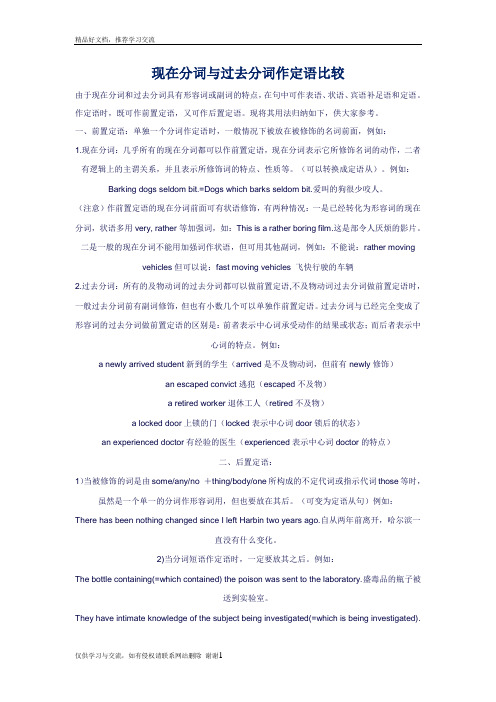
现在分词与过去分词作定语比较由于现在分词和过去分词具有形容词或副词的特点,在句中可作表语、状语、宾语补足语和定语。
作定语时,既可作前置定语,又可作后置定语。
现将其用法归纳如下,供大家参考。
一、前置定语:单独一个分词作定语时,一般情况下被放在被修饰的名词前面,例如:1.现在分词:几乎所有的现在分词都可以作前置定语,现在分词表示它所修饰名词的动作,二者有逻辑上的主谓关系,并且表示所修饰词的特点、性质等。
(可以转换成定语从)。
例如:Barking dogs seldom bit.=Dogs which barks seldom bit.爱叫的狗很少咬人。
(注意)作前置定语的现在分词前面可有状语修饰,有两种情况:一是已经转化为形容词的现在分词,状语多用very, rather等加强词,如:This is a rather boring film.这是部令人厌烦的影片。
二是一般的现在分词不能用加强词作状语,但可用其他副词,例如:不能说:rather moving vehicles但可以说:fast moving vehicles 飞快行驶的车辆2.过去分词:所有的及物动词的过去分词都可以做前置定语,不及物动词过去分词做前置定语时,一般过去分词前有副词修饰,但也有小数几个可以单独作前置定语。
过去分词与已经完全变成了形容词的过去分词做前置定语的区别是:前者表示中心词承受动作的结果或状态;而后者表示中心词的特点。
例如:a newly arrived student新到的学生(arrived是不及物动词,但前有newly修饰)an escaped convict逃犯(escaped不及物)a retired worker退休工人(retired不及物)a locked door上锁的门(locked表示中心词door锁后的状态)an experienced doctor有经验的医生(experienced表示中心词doctor的特点)二、后置定语:1)当被修饰的词是由some/any/no +thing/body/one所构成的不定代词或指示代词those等时,虽然是一个单一的分词作形容词用,但也要放在其后。
现在分词和过去分词PPT课件
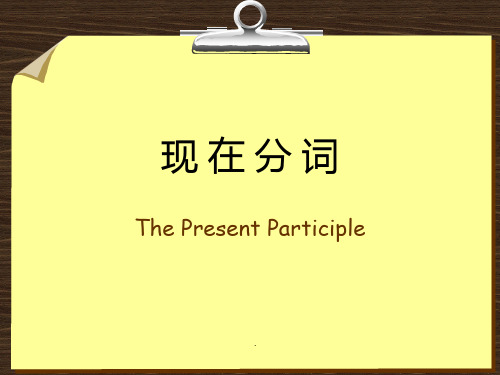
The Present Participle
.
现在分词的形式
主动语态
被动语态
一般式
Doing
Being done
完成式
ne
• 现在分词的一般式通常表示其动作与谓语 动词的动作同时发生。如:
She sat there reading a novel.
其中一位代表提出了一个令人难堪的问题。
.
现在分词短语做定语时通常后置, 相当于一个定语从句
• Most of the young teachers working in this university are
Ph.D..
在这所大学工作的大多数 年轻教师都是博士。
相当于定语从句:who work in this university
现在分词短语强调与谓语动词的动作发生的顺序时,前 面可带有when,while,after,before,since等从属连词。
.
现在分词(短语)作原因状语
• Having no place to go, the man wandered about in the
street.
由于没有要去的地方,那个男
.
现在分词(短语)作条件状语
• Working hard, you will succeed. 努力工作,你就会成功。
• Standing on the building, you can see the whole city. 站在那座楼上,你会看到整个城市。
.
现在分词(短语)作让步状语
• Such committees, being very balanced, almost never succeed in making unequivocal judgments. 这种委员会虽然代表性很均衡,但几乎从未做出 过十分明确的决定。
高中英语分词做定语和状语课件(共74张PPT)

分词作状语功能表
表示的范围
相当的状语从句
1.时间
时间状语从句
2.原因
原因状语从句
3.条件 4.让步
条件状语从句 让步状语从句
5Hale Waihona Puke 方式/伴随并列句①表示时间 当他听到这一消息,他高兴得手舞足蹈。
When he heard the news, he jumped with joy. Hearing the news, …
A. Writing C. Written
B. Having written D. Being written
•
the office, the
foreign visitors were shown round
the teaching building.
teacher.
②The girl _s_in__g_in__g (sing)for us is ten years old.
③What’s the language __sp__o_k_e_n_ (speak)in
Germany?
④This is one of the schools __b__u_i_lt_(build) in
7. The flowers _______ sweet in the
botanic garden attract the visitors to
the beauty of nature.
A. to smell
B. smelling
C. smelt
D. to be smelt
分词做状语
分词作状语,在意义上相当于 一个状语从句。
现在分词:主动,进行
分 词
过去分词:被动,完成
2023年高考英语一轮专题复习语法精讲:非谓语动词(3) 课件

考法训练
单句语法填空
4.Today my daughter and I went to a parking lot __to__se_ll_ (sell) some of our eggs.
5 . No agreement __re_a_ch_e_d (reach) at the meeting, the representatives wanted another round of talk.
用法 多表示在谓语动词之后发生的动
作,表示将来的动作
表示主动、进行
表示被动、完成
例题讲解
考法二 考查非谓语动词作定语的用法
[全国新高考Ⅰ2021·63] Though it is the only unnatural thing on your way up the mountain, still it highlights the whole adventure and offers a place where you can sit down to rest your ______ (ache) legs.
句意为:那里的活动有观赏鲸鱼、远足等,且(提供 的)住宿力求对自然环境产生较轻的影响。aim to do sth.意为“力求做某事”,为固定搭配。故填to have。
考法三 考查非谓语动词作宾语、补语、主语和表语的用法
例题讲解
2 [全国甲2021·63] It is possible ______ (walk) or bike the entire 14 kilometers.
句意为:走完或者骑行完整整14千米是有可 能的。It is possible to do sth.是固定句型,意 为“做某事是有可能的”。故填to walk。
过去分词作定语与表语

概念引入今天我们要学习过去分词作表语和定语的用法。
先看下面这些句子:1.Buthebecame inspired whenhethoughtabouthelpingordinarypeople exposed tocholera.(inspired过去分词作表语;exposed过去分词作定语)2.Somanythousandsof terrified peoplediedeverytimetherewasanoutbreak.(terrified过去分词作定语)3.Hebecame interested intwotheoriesthatpossiblyexplainedhowcholerakilledpeople.(interested过去分词作表语)4.Fromthestomachthediseasequicklyattackedthebodyandsoonthe affected persondied.(affected过去分词作定语)5.Hewas determined tofindoutwhy.(determined过去分词作表语)6.Hefoundthatitcamefromtheriver polluted bythedirtywaterfromLondon.(polluted过去分词作定语)上面句子中的黑体词都是过去分词,句1(inspired)、句3、句5中的三个词跟在系动词became、was后作表语;而句1(exposed)、句2、句4、句6中的四个词放在名词前或后修饰名词,作定语。
那么过去分词是什么?有什么作用?我们将在本单元和下两个单元中与同学们一起学习。
用法讲解过去分词的作用英语中动词如果不作谓语时叫非谓语动词。
非谓语动词分为:不定式(todo)、动词-ing 形式(doing)和过去分词(done)。
动词-ing形式可分为现在分词和动名词:现在分词强调动作,如asleepingboy中的sleeping强调“睡觉”这一动作,而且此动作正在进行,与所修饰词boy有逻辑上的主谓关系(即sleeping的动作是boy做的),因此是现在分词作定语;而asleepingbag中的sleeping强调功能,表示“用来睡觉的”,是动名词作定语。
过去分词作定语和状语的用法总结
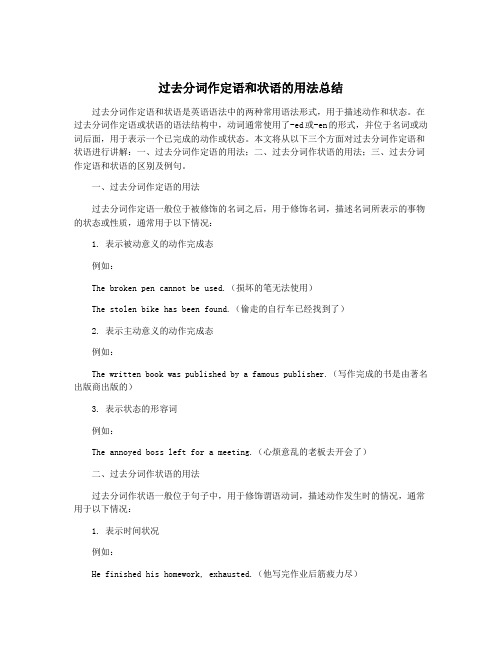
过去分词作定语和状语的用法总结过去分词作定语和状语是英语语法中的两种常用语法形式,用于描述动作和状态。
在过去分词作定语或状语的语法结构中,动词通常使用了-ed或-en的形式,并位于名词或动词后面,用于表示一个已完成的动作或状态。
本文将从以下三个方面对过去分词作定语和状语进行讲解:一、过去分词作定语的用法;二、过去分词作状语的用法;三、过去分词作定语和状语的区别及例句。
一、过去分词作定语的用法过去分词作定语一般位于被修饰的名词之后,用于修饰名词,描述名词所表示的事物的状态或性质,通常用于以下情况:1. 表示被动意义的动作完成态例如:The broken pen cannot be used.(损坏的笔无法使用)The stolen bike has been found.(偷走的自行车已经找到了)2. 表示主动意义的动作完成态例如:The written book was published by a famous publisher.(写作完成的书是由著名出版商出版的)3. 表示状态的形容词例如:The annoyed boss left for a meeting.(心烦意乱的老板去开会了)二、过去分词作状语的用法过去分词作状语一般位于句子中,用于修饰谓语动词,描述动作发生时的情况,通常用于以下情况:1. 表示时间状况例如:He finished his homework, exhausted.(他写完作业后筋疲力尽)She stood there, frozen with fear.(她站在那里,惊恐万分)2. 表示原因或结果例如:Having saved enough money, he bought a new car.(存够了钱,他买了一辆新车)Being late for the meeting, they missed their chance.(因为迟到,他们错过了机会。
)3. 表示条件状况例如:Having finished the task, he went home.(完成任务后,他回家了)三、过去分词作定语和状语的区别及例句过去分词作定语和状语的最大区别在于它们所修饰的词不同。
过去分词的用法
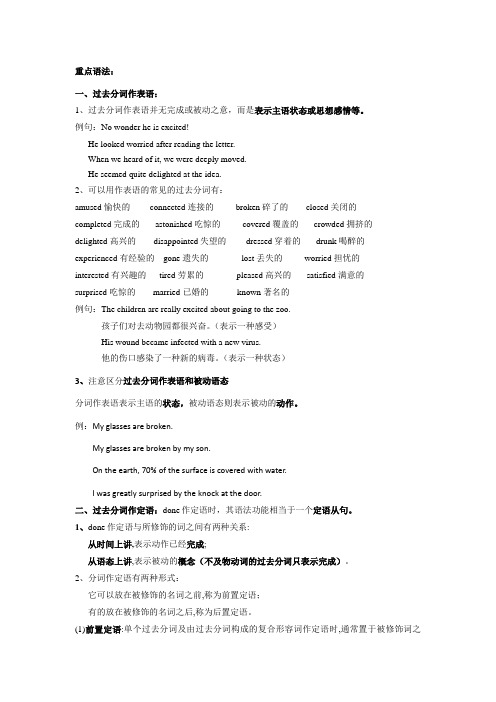
重点语法:一、过去分词作表语:1、过去分词作表语并无完成或被动之意,而是表示主语状态或思想感情等。
例句:No wonder he is excited!He looked worried after reading the letter.When we heard of it, we were deeply moved.He seemed quite delighted at the idea.2、可以用作表语的常见的过去分词有:amused 愉快的 connected 连接的 broken 碎了的 closed 关闭的completed 完成的 astonished 吃惊的 covered 覆盖的 crowded 拥挤的delighted 高兴的 disappointed失望的 dressed 穿着的 drunk 喝醉的experienced 有经验的 gone 遗失的 lost 丢失的 worried 担忧的interested 有兴趣的 tired 劳累的 pleased 高兴的 satisfied 满意的surprised 吃惊的 married 已婚的 known 著名的例句:The children are really excited about going to the zoo.孩子们对去动物园都很兴奋。
(表示一种感受)His wound became infected with a new virus.他的伤口感染了一种新的病毒。
(表示一种状态)3、注意区分过去分词作表语和被动语态分词作表语表示主语的状态,被动语态则表示被动的动作。
例:My glasses are broken.My glasses are broken by my son.On the earth, 70% of the surface is covered with water.I was greatly surprised by the knock at the door.二、过去分词作定语:done作定语时,其语法功能相当于一个定语从句。
过去分词的用法
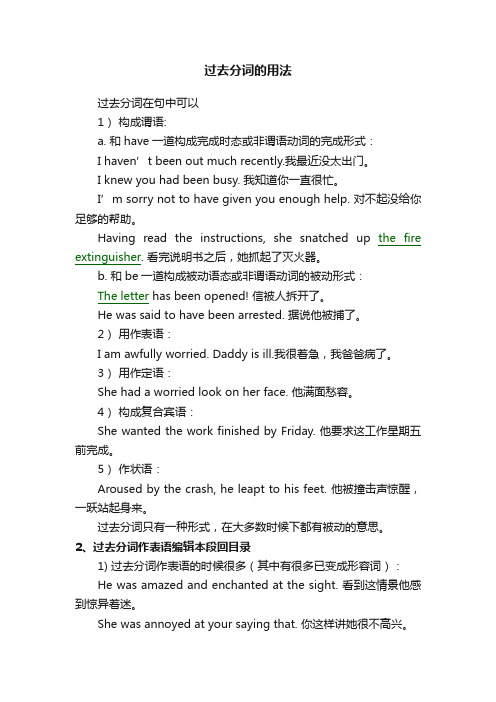
过去分词的用法过去分词在句中可以1)构成谓语:a. 和have一道构成完成时态或非谓语动词的完成形式:I haven’t been out much recently.我最近没太出门。
I knew you had been busy. 我知道你一直很忙。
I’m sorry not to have given you enough help. 对不起没给你足够的帮助。
Having read the instructions, she snatched up the fire extinguisher. 看完说明书之后,她抓起了灭火器。
b. 和be一道构成被动语态或非谓语动词的被动形式:The letter has been opened! 信被人拆开了。
He was said to have been arrested. 据说他被捕了。
2)用作表语:I am awfully worried. Daddy is ill.我很着急,我爸爸病了。
3)用作定语:She had a worried look on her face. 他满面愁容。
4)构成复合宾语:She wanted the work finished by Friday. 他要求这工作星期五前完成。
5)作状语:Aroused by the crash, he leapt to his feet. 他被撞击声惊醒,一跃站起身来。
过去分词只有一种形式,在大多数时候下都有被动的意思。
2、过去分词作表语编辑本段回目录1) 过去分词作表语的时候很多(其中有很多已变成形容词):He was amazed and enchanted at the sight. 看到这情景他感到惊异着迷。
She was annoyed at your saying that. 你这样讲她很不高兴。
We were so bored that we couldn’t help yawning. 我们烦得要命禁不住打哈欠。
现在分词、过去分词和动名词的用法
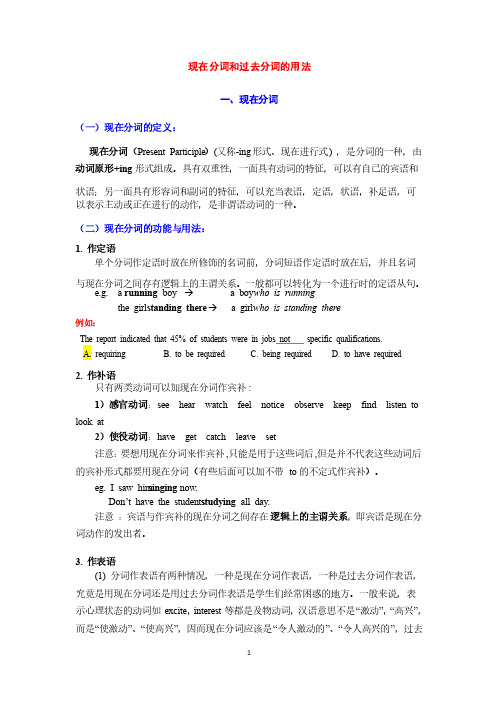
现在分词和过去分词的用法一、现在分词(一)现在分词的定义:现在分词(Present Participle )(又称-ing 形式、现在进行式) ,是分词的一种,由动词原形+ing 形式组成。
具有双重性,一面具有动词的特征,可以有自己的宾语和状语;另一面具有形容词和副词的特征,可以充当表语,定语,状语,补足语,可以表示主动或正在进行的动作,是非谓语动词的一种。
(二)现在分词的功能与用法:1. 作定语单个分词作定语时放在所修饰的名词前,分词短语作定语时放在后,并且名词与现在分词之间存有逻辑上的主谓关系。
与现在分词之间存有逻辑上的主谓关系。
一般都可以转化为一个进行时的定语从句。
一般都可以转化为一个进行时的定语从句。
e.g. a running boy à a boy w ho is running who is runningthe girl s tanding there standing there à a girl w ho is standing there who is standing there例如:The report indicated that 45% of students were in jobs not specific qualifications. A. requiring B. to be required C. being required D. to have required 2. 作补语只有两类动词可以加现在分词作宾补: 1)感官动词:see hear watch feel notice observe keep find listen to look at 2)使役动词:have get catch leave set注意:要想用现在分词来作宾补,只能是用于这些词后,但是并不代表这些动词后的宾补形式都要用现在分词(有些后面可以加不带to 的不定式作宾补)。
- 1、下载文档前请自行甄别文档内容的完整性,平台不提供额外的编辑、内容补充、找答案等附加服务。
- 2、"仅部分预览"的文档,不可在线预览部分如存在完整性等问题,可反馈申请退款(可完整预览的文档不适用该条件!)。
- 3、如文档侵犯您的权益,请联系客服反馈,我们会尽快为您处理(人工客服工作时间:9:00-18:30)。
• 此外,过去分词短语还可以和介词“with”或 “without”连用,具副词作用。如:
• With the water pipe choked, there wasn't any more water for use.
• Without anything left in the kitchen, the Wangs decided to eat out.
• (3)由 if, unless 引导,表示“条件”,如:
• If kept for too long, some medicines will lose their effectiveness.
• We have made a point of not attacking unless attacked.
• (4)由 though, although, even though 连词引 导,表示“让步 ”,如:
• Though warned of the danger, they still went mountaineering.
• Even though defeated for a second time, our team did not give up hope for the final victory.
• A.when taking B. when taken • C. when to take D. when to be taken • 2.Generally speaking, _____ the drug
according to the directions, you will • recover soon. • A. when taking B. when taken • C. when take D. when having taken
• 最后,过去分词短语,在适当情况下,可以有 自己的主语而变成独立主格结构(the absolute construction),如:
• The young man hit by a private car, his legs were badly hurt.
• 过去分词作定语,在语态上,表被动;在 时间上,表示动作已经发生或完成,与它 所修饰的名词有逻辑上的动宾关系。过去 分词作定语时,所修饰的名词在逻辑上相 当于被动句中的主语,过去分词相当于谓 语。
• 过去分词作定语表示动作在谓语动作之 前发生,已经完成并具有被动意义。有时 也不表示时间性。作定语的过去分词一般 由及物动词变来,因为只有及物动词才有 被动意义。例如: He is a teacher loved by his students. 他是个很受学生爱戴的老师。
”,如:
• Mosquitoes should be completely exterminated where found.
• Retirees in good health should be invited to return to work wherever needed.
• 1.Generally speaking, _____ according to the directions, the drug has no side effect.
• (4)条件,如:
• Given more time, the slow learners would have done better.
• Reminded by someone else, Tony would not have made such a mistake.
• 除了直接修饰动词之外,过去分词或短语也可 以和连词合组成短语,表示下列四种意思:
• 过去分词作状语可以表达下列四种意思 :
• (1)方法或活动方式,(伴随)如:
• He walked back and forth, lost in thought.
• I sat before the desk until after midnight, absorbed in writing.
• Surrounded by a host of fans, the film star left the airport excitedly.
• (2)原因,如:
• Greatly disappointed, some staff decided to leave the company.
• Tired from the long journey, Tom fell fast asleep the instant he went home.
• (3)时间,如: • Born and bred in a turbulent(动荡的) age,
the older generation of people experienced all sorts of hardships.
• Thrown to the floor, the boy regained his footing a few minutes later.
过去分词作为定语 和状语的用法
<past participle
used as adverbial
and ttribute>
过去分词作状语表示被动的和完成的动作 。
(1) Written in a hurry, this article was not so good!
【注意】written 为过去分词作状语,表示 这篇文章是被写的,而且已经被写。 值 得注意的是,有些过去分词因来源于系表 结构,作状语时不表被动而表主动。这样 的过去分词及短语常见的有: lost , seated, hidden , stationed , lost / absorbed in , born , dressed in , tired of
• (1)由 when, whenever, while, until 等连词引 导,表示“ 时间”,如:
• When asked about his previous job, Bill said he had been a pub singer.
• Susan seldom speaks in class until spoken to. • (2)由 where, wherever 连词引导,表示“地点
